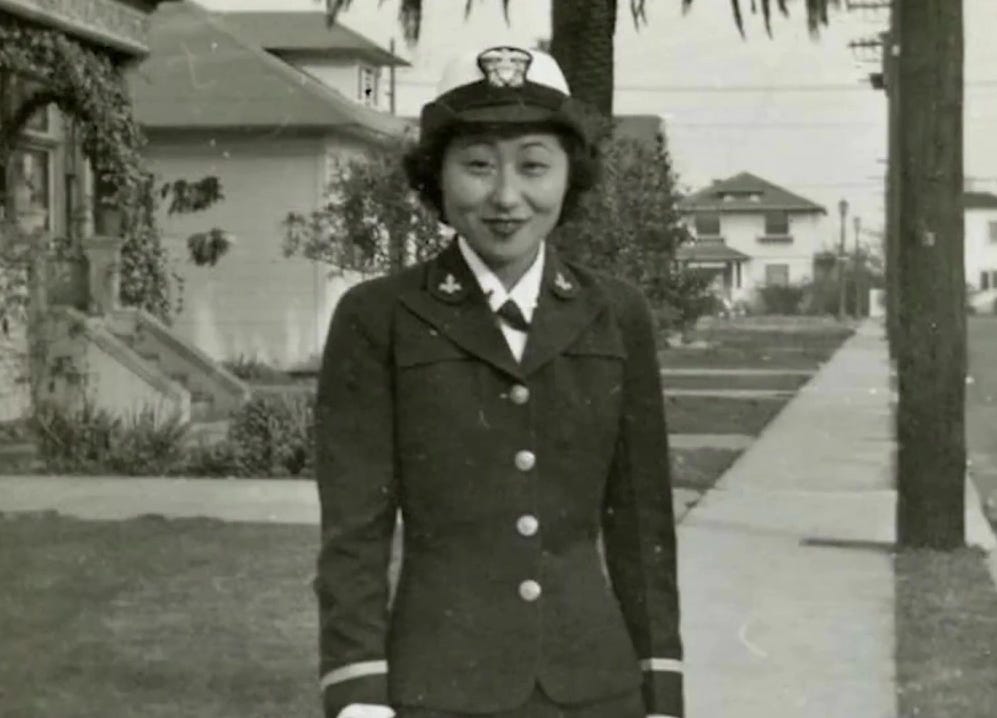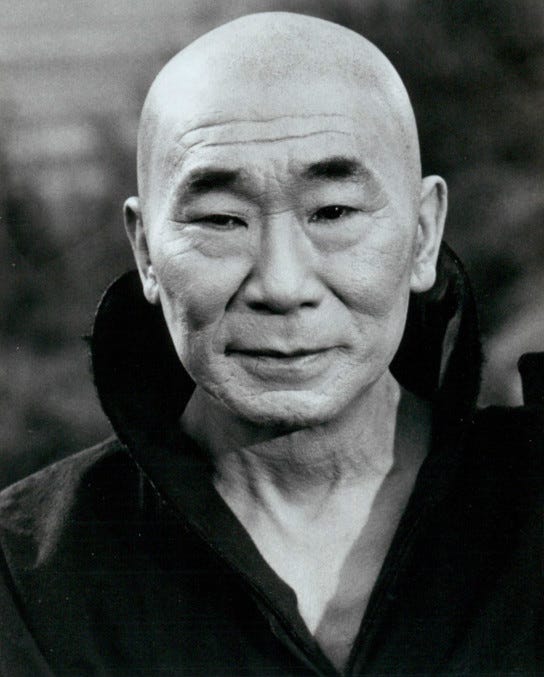The Heart That Held the Family Together
feminism, tropical drinks & Philip Ahn’s storied career with Christine Cuddy
I’m delighted to introduce this month’s interview with Christine Cuddy, the niece of Philip Ahn—Anna May Wong’s childhood friend and co-star in Daughter of Shanghai (1937) and King of Chinatown (1939). Christine, who is an entertainment lawyer and partner at Kleinberg, Lange, Cuddy & Carlo LLP where she represents heavyweights like George R. R. Martin and the late Anne Rice, was gracious enough to spend some time with me and reminisce about her Uncle Philip. She also shared her mother’s equally impressive career in the U.S. Navy and talked about what it was like working at the Ahn family restaurant, the Moongate, as a teenager.
We first connected after I wrote an opinion piece in the New York Times about Asian Americans in early Hollywood, in which I mentioned your uncle Philip Ahn. What was it like growing up with a famous uncle? Are there any specific memories that stand out about him?
Uncle Philip was always looking for eligible young men for me to meet. At the end of his life, he was at Cedars-Sinai Hospital, very ill with lung cancer. He was in an oxygen tent, wearing a mask. There was a young medical resident taking care of him. From under the tent, he managed to nicely introduce me to the doctor.
He had a beautiful house in Northridge with a pool, which was not that usual in those days. So we would all go there in the summer and swim. Philip was the one who hosted all the family functions, like Thanksgiving dinner and Christmas parties. He was a very good cook, so he would make the turkey. I still remember those gatherings. My mom and my aunts would all wear little black dresses. It was great. So he was kind of like the family patron.
He really did keep the family together. And then he passed away in 1978. He had lung cancer because he was a big smoker. In all those years, everyone was smoking. And so he passed away and the family never recovered from that. There was no one capable of stepping into that role.
My goodness, what a sweet man. Even on his deathbed, he was thinking of how he could fix you up with a handsome doctor! I see why he and Anna May were friends. I think they both had that in common—this idea that it was their responsibility to host and take care of their family. There’s something very traditional about that and it makes sense when you consider that neither of them ever married.
Now, the Ahns as a family are incredibly distinguished. As I’ve mentioned in previous dispatches (here and here), your grandfather Dosan was the leader of the Korean independence movement and is still revered today. Could you tell us about your mother, Susan Ahn Cuddy, and how she similarly distinguished herself as a Korean American?
My mom joined the Navy during World War II. Despite racial prejudice, she was the first woman to become a gunnery officer and taught pilots how to shoot machine guns from airplanes. Her father was an outspoken feminist. In Korea at the turn of the century, he was very much for equal rights for women. I think that that really inspired my mom. That's one of the reasons that she was able to accomplish what she did. She had a father who would have said, “Yeah, you wanna be a gunnery officer? That's fine. Go ahead.” After the war, she went to work for the National Security Agency, where she was a codebreaker, supervising 300 employees. She left the NSA when she saw what the U.S. was starting to do in Vietnam.

In the 1950s, your family moved from Virginia, where your parents were working for the NSA, to Los Angeles to help out with the new family business, a Chinese restaurant called the Moongate. (Coincidentally, Anna May also named her home in Santa Monica Moongate.) What was the Moongate like? And why did your Korean family decide to open a Chinese restaurant? What was it like working there as a teenager?
The family owned a Cantonese restaurant because no prospective customers knew about Korean food at the time. (They didn’t know about Mandarin food either.) Starting at age 9, I worked in the office with my mom, processing credit card receipts and sending them in for payment. When I was older, I worked as a hostess, greeting customers and taking them to their tables. My brother and I always worked on Mother's Day because that was one of the busiest days of the year. New Year's Eve was the other big night of the year.

They remodeled the restaurant in the early sixties and it became more like a Trader Vic sort of place that was very tropical and more Polynesian. And my Irish American dad, who was formerly in Naval Intelligence, was actually a very good bartender. He basically designed all the tropical drinks and wrote the descriptions on the menu, which are really amazing.
I love that! I’m always so fascinated by stories of family-run restaurants, which are really a staple of the Asian immigrant community—and something I explored in a photojournalism project called Thank You Enjoy several years before I got started on the AMW biography.
Back to your Uncle Philip—he had a long, prolific career as an actor, appearing in more than 200 films and television shows. He and Anna May made history in Daughter of Shanghai (1937) as the first Asian American actors to play a leading romantic couple in the sound era. The last time we spoke, you mentioned how exciting it was to watch your uncle become a kind of Asian icon based on his wise Shaolin master character in the 1970s TV series Kung Fu, starring David Carradine as the biracial Asian lead. When you reflect on your uncle’s career, how do you think about both the challenges and triumphs he experienced? (Btw, I have to mention I recently watched the first two episodes of Kung Fu and found it fascinating!)
I so enjoyed seeing Uncle Philip and Anna May in Daughter of Shanghai and King of Chinatown, where they ended up as a couple! It seems that after that he never played a romantic part. He enjoyed playing evil Japanese officers in WWII propaganda movies. In the 1950s and 60s, he played laundrymen and other subservient roles, although he did play a doctor on Bonanza once! I was so happy that at the end of his career he was able to play a revered and respected character on Kung Fu.
How did your uncle influence your own career in entertainment?
As for his influence on my career: He often invited me to visit him on the set when he was working. Also, I always read his copies of Variety and the Hollywood Reporter, where I learned a lot about the entertainment business.
When Philip passed away and his possessions had to be sorted out, you mentioned that you asked to keep his autographed photos of Anna May Wong. What did her career alongside your uncle’s mean to you? Did Philip ever share any stories with you about his childhood friend Anna May?
On further reflection, I believe Uncle Philip actually gave me the Anna May photos before he died, although I don’t remember him sharing specific stories. Now that Anna May has become such an icon, perhaps he will be more remembered as well. How about a Philip Ahn Ken doll?
I’d drink a mai tai to that!









Very nice article. Sue Ahn Cuddy was a great lady, from all accounts. She and her hubby "found a way" to get married in DC. When it was not so easy. Good for them.